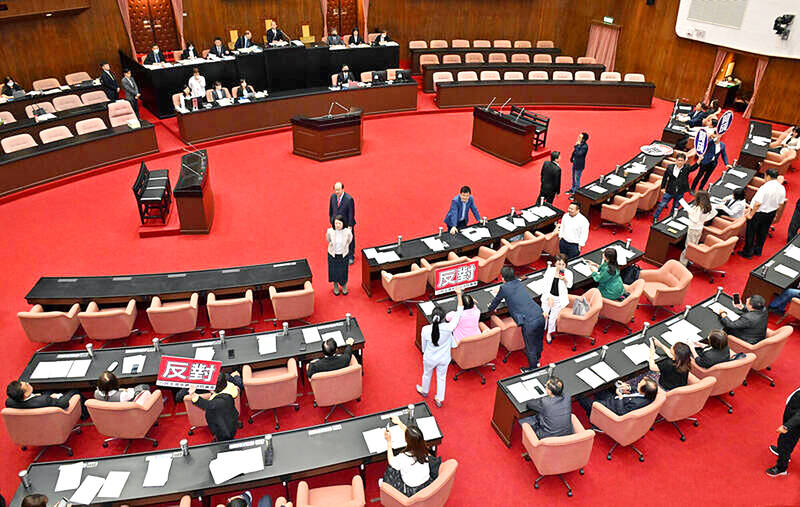The Chinese Nationalist Party (KMT) yesterday proposed inviting president-elect William Lai (賴清德) to make a historic first state of the nation address at the legislature following his inauguration on May 20.
Lai is expected to face many domestic and international challenges, and should clarify his intended policies with the public’s representatives, KMT caucus secretary-general Hung Meng-kai (洪孟楷) said when making the proposal at a meeting of the legislature’s Procedure Committee.
The committee voted to add the item to the agenda for Friday, along with another similar proposal put forward by the Taiwan People’s Party (TPP).

Photo: Tien Yu-hua, Taipei Times
The invitation is in line with Article 15-2 of the Act on Exercising Legislative Yuan Powers (立法院職權行使法), Hung said, urging the Democratic Progressive Party (DPP) caucus not to block the measure.
Legislative Speaker Han Kuo-yu (韓國瑜) is to chair cross-caucus negotiations and everything would be on the table, he added.
The TPP yesterday said that the legislature should hear a state of the nation address.
The legislature can invite the president to deliver such an address at the opening session every year, it said, adding that Lai should, by law, be required to answer legislators’ questions.
DPP caucus convener Rosalia Wu (吳思瑤) said that Lai was amenable to making such an appearance and that the party was willing to discuss the issue during cross-caucus negotiations as long as the demands are legal.
The parties were unclear on whether Lai would leave after giving the address, or whether he should respond individually to each question or address all questions simultaneously, Wu said, suggesting that the party caucuses address the issue by clarifying Article 15-4 of the Legislative Yuan Powers Act.
The article states that party caucuses should discuss during cross-caucus negotiations the total time for questions, the number of people, the order in which they ask their questions and the number of questions allotted to parties based on legislative seats, should legislators still have questions after the president’s address.
Separately, DPP Legislator Puma Shen’s (沈伯洋) proposal to restrict elected representatives from visiting China was again blocked from being put on the discussion roster by the Procedure Committee.
The KMT also proposed removing the restrictions on people wishing to visit China, prioritize measures to allow Chinese tourists to visit the offshore counties of Kinmen, Penghu and Lienchiang, and increase prices for public food procurement from NT$26 per kilogram to NT$34 per kilogram.
Additional reporting by CNA

The Taiwanese passport ranked 33rd in a global listing of passports by convenience this month, rising three places from last month’s ranking, but matching its position in January last year. The Henley Passport Index, an international ranking of passports by the number of designations its holder can travel to without a visa, showed that the Taiwan passport enables holders to travel to 139 countries and territories without a visa. Singapore’s passport was ranked the most powerful with visa-free access to 192 destinations out of 227, according to the index published on Tuesday by UK-based migration investment consultancy firm Henley and Partners. Japan’s and

NATIONAL SECURITY THREAT: An official said that Guan Guan’s comments had gone beyond the threshold of free speech, as she advocated for the destruction of the ROC China-born media influencer Guan Guan’s (關關) residency permit has been revoked for repeatedly posting pro-China content that threatens national security, the National Immigration Agency said yesterday. Guan Guan has said many controversial things in her videos posted to Douyin (抖音), including “the red flag will soon be painted all over Taiwan” and “Taiwan is an inseparable part of China,” while expressing hope for expedited “reunification.” The agency received multiple reports alleging that Guan Guan had advocated for armed reunification last year. After investigating, the agency last month issued a notice requiring her to appear and account for her actions. Guan Guan appeared as required,

Japan and the Philippines yesterday signed a defense pact that would allow the tax-free provision of ammunition, fuel, food and other necessities when their forces stage joint training to boost deterrence against China’s growing aggression in the region and to bolster their preparation for natural disasters. Japan has faced increasing political, trade and security tensions with China, which was angered by Japanese Prime Minister Sanae Takaichi’s remark that a Chinese attack on Taiwan would be a survival-threatening situation for Japan, triggering a military response. Japan and the Philippines have also had separate territorial conflicts with Beijing in the East and South China

A strong cold air mass is expected to arrive tonight, bringing a change in weather and a drop in temperature, the Central Weather Administration (CWA) said. The coldest time would be early on Thursday morning, with temperatures in some areas dipping as low as 8°C, it said. Daytime highs yesterday were 22°C to 24°C in northern and eastern Taiwan, and about 25°C to 28°C in the central and southern regions, it said. However, nighttime lows would dip to about 15°C to 16°C in central and northern Taiwan as well as the northeast, and 17°C to 19°C elsewhere, it said. Tropical Storm Nokaen, currently